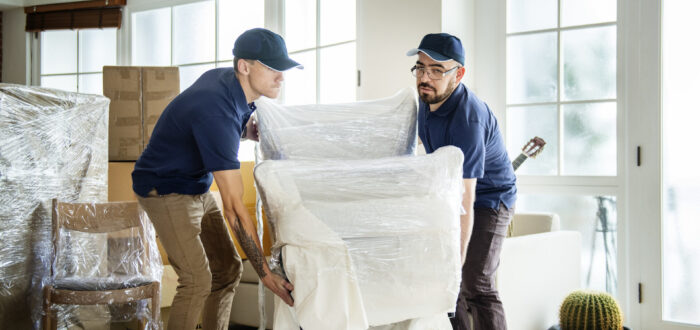

How to Avoid Injury While Moving Cross Country?
Posted in How-to,Planning the Move on June 9, 2022
When you decide to move, knowing how to avoid injury while moving is probably the last thing on your mind. However, you should be aware of the fact that last year there were numerous reports about lifting-reported injuries. In fact, there were about 85,000 cases. All this means you should try and learn how to lift heavy objects properly and prevent further harm.
If you don’t want to get injured during your move, the first thing to do is to plan the entire process properly. That way, you can take care of yourself and get enough sleep that will help you prepare your body for lifting and pulling heavier objects with some of the best techniques. It’s also important to dress adequately and clear all the paths in your home. Last but not least, hire professionals that will be by your side for everything you might need, including carrying bulky items instead of you.
Planning the Entire Move Adequately Will Ensure Your Safety
With many things on your mind, it’s more than easy to have some tasks slip your way. And it’s completely normal since just finding reliable cross-country moving services can be a handful of jobs in itself. That’s why having everything planned ahead is more than just needed.
So, before you start panicking, take some time to create a to-do list with all the necessary tasks – from deciding whether you’ll need a professional packing service for your fragile items to determining whether car shipping is a good idea at all. In the end, you’ll realize that having a list of tasks to do is probably the greatest thing you can do because it will keep you updated, and you won’t have to worry about whether something’s forgotten.
Avoid Rushing Tasks and Last-Minute Changes
As mentioned before, having everything planned for the big day is crucial. Although a last-minute move is manageable, it’s not recommended, especially if you’re searching to answer one simple question: How do you keep safe while moving across the country? In fact, many people’s biggest concern is how to move safely. So, think through whether rushing a relocation is something you want or whether you prefer doing things slowly and cautiously.
Getting Enough Hours of Sleep Is Pro Tip for a Successful Moving Day
If you’re moving out for the first time, you’re probably not so familiar with all the facts that will come along. For example, it’s one of the most stressful and tiring events in people’s lives. So, besides making a moving out list, you also should follow some of the most useful relocation day tips, too – one of which is getting enough sleep.
Without the needed energy, you could end up stressing even more than you would, and the whole process will be slowed down, and you surely do not want that. Having at least eight hours of sleep is something you should work on.
Plan the Packing Process and Don’t Overload Boxes When Moving Cross-Country
Organizing the packing will save you a lot of trouble because many people find this task one of the most daunting in the whole relocation. As you can imagine, starting on time is the best approach. That way, you can create an inventory list and think through what to downsize for a move.
However, during the packing process, you’ll have to be aware of all the weight you’ll be carrying and keep a relatively light load in all the boxes. Otherwise, you’ll end up hurting yourself or might even have to repack something all over again – most boxes aren’t meant to be overfilled because they can tear apart easily.

How to Avoid Injury While Moving Across the Country – Prepare Your Body for the Upcoming Work
When you finally find one of the best cities for Millennials that will fit your needs, there are more things to consider when relocating to a new state. For example, you have to answer the question, how can you avoid potential injury when pulling a load? You can search online for the right answer, and you’ll surely find it, but the crucial thing is to actually prepare your body for lifting and carrying some heavier weight.
Unless you’re an active athlete or work out constantly, you’ll have to take care of your muscles properly. So, check the following steps and do not worry about hurting your back and other body parts.
Don't stoop to twist while carrying bulky things
The best method is to bend at the knees, which will keep the spine straight, and utilize the stronger muscles for lifting. On the other hand, twisting can cause injuries to ligaments and joints.
Don't carry boxes on your head or shoulders when long-distance moving
Having the load on your head or a high plane of your body will surely rattle your balance and make you fall easily.
Stretching before and after carrying is a must
Do not skip the part where you warm up before pulling and carrying boxes and furniture. Slowly stretch arms and legs, and bend at the waist, touching toes.
Listen to your body and stop if something doesn't feel right
If you feel like something’s just too heavy for you, don’t neglect it! Pay attention to what your body has to say and stop as soon as you notice any kind of pain or discomfort.
What Are the Tips to Avoid Back Injuries – Learning Some of the Best Lifting Techniques Will Surely Help
Which safety measures can be used to prevent injuries while lifting and shifting? This is just one of the questions you should answer to overcome all the negative situations that might occur. So, let’s assume you’re working with a heavier box.
If you do not follow some of the relocation tips, you could end up hurting your back, hips, and knees, all of which could be serious issues. So, start with bending at your knees and let your legs do the lift part. The big secret is to use your legs instead of your back in addition to keeping it straight throughout the movement.
Clear All the Paths You and Cross-Country Movers Will Use
When the big day comes, you need to ensure your home is ready for movers and all the work done. Just imagine how hard it is to get through a room full of packages, supplies, and other stuff. Getting through the hallway will practically become mission impossible. And not to mention how dangerous it can be to walk and be able to see what’s in front of you while carrying more than one box.
We all know how this new situation can be overwhelming, but you still have to think about the safety of everyone involved. If you’re getting professional assistance, this is an essential part of preparing for cross-country movers. You should also get rid of everything from your house that’s not necessary, especially the things movers won’t move. Keep all the paths clear and open because you know how the saying goes – better safe than sorry.

Know What to Wear When the Cross-Country Movers Arrive
Another step that will help avoid hurting yourself and others is figuring out what is best to wear on the big day. This might sound like an unnecessary thing to do, but just imagine what will happen if you do not lift and carry a bulky object or a box in comfortable clothing. So, keep in mind the following pieces while packing clothes for the move and set them aside.
- Comfortable pants,
- Long sleeves shirt,
- Sneakers or boots,
- Gloves.
Besides this gear, consider also having more protective equipment, especially if you’ve been injured or know someone who has been before. Having a back brace will be a great support for your back, while a knee brace helps you stabilize unstable knees.
Other Moving-Related Equipment You’ll Need to Avoid Back Pain After Moving Furniture
If you’re thinking of combining safety and efficiency, then the right equipment will do the job. Carrying heavy objects can get you hurt in so many ways, and these tools will not only prevent that but also save you a lot of energy. So what are the three guidelines for avoiding injury when it comes to bulky items:
- Sliders – this piece of gear is perfect for not carrying an object. For example, if you’re dealing with a washer, and instead of hurting your back by doing it on your own, you can simply lift it with sliders.
- Straps – great for transferring the weight of the item you’re carrying off the back of your arms and shoulders to the entire body.
- Dolly – without dollies, you shouldn’t even plan a move. In other words, they can help you with bulky furniture, appliances, and if you want to take care of more than just one box.
Take Care of Your Children and Pets, so They Don’t Suffer Any Injuries While Preparing for Cross-Country Moving
There’s undoubtedly a lot going on during a relocation, from finding the right relocation crew to mentally preparing yourself to leave the home you’ve lived in for years. However, if you want this move to be successful, you’ll have to figure out how to adjust to a new reality and do all the needed tasks as best as possible.
If you’re relocating with kids, it’s a bit of a different story for those who aren’t. People who move with pets are in pretty much the same situation, as they have to be taken care of, as well. Besides, they can get overwhelmed by the whole relocation process, feel depressed after the move, or even get hurt during it. In order to help them, one of the most effective tips is to keep them away.
Ask a family member or a friend if they can take care of your little one and furry friend for that day. That way, you won’t have to worry about them and their safety, and they surely won’t experience a possible traumatic situation.
Ask for Professional Help From Reliable Long-Distance Movers
Although you might think you can handle the entire move on your own, know it’s one of the biggest relocation mistakes you can make. And the sooner you realize this, the more time you’ll have to find and choose a reliable relocation company.
So, check out more than one company and watch out for the relocation scams (you can do it easily by visiting the Federal Motor Carrier Safety Administration – FMCSA). After all, having your relocation professionally guided will prevent all the stress and inconveniences you might run into when DIY-ing.

Be Aware of Your Limitations, Take a Rest Once in a While, and Invest in Cross Country Moving Services
Without proper planning and professional assistance, long-distance moving can turn into an absolute disaster. However, even if you consider all the needed assistance and techniques that will make the carrying effortless, you still need to make sure you’re aware of your own limitations. If you feel like something is too heavy, leave it or ask for a helping hand. Also, ensure you have a quick rest once in a while and drink water. Only that way you’ll have one of the best relocation experiences, and you can pass it on to other people who are relocating the same as you.
FAQ
What Are the Most Common Injuries Associated With Moving?
Moving heavy objects is a task that can result in serious injury due to the strain placed on muscles and ligaments. Common injuries associated with moving include sprains, strains, slipped discs, pulled muscles, nerve damage in the neck and back, shoulder impingement syndrome, rotator cuff tears, knee strains, and more. Proper technique is essential for reducing the risk of injury during movement. Taking breaks often, stretching before and after moving items, and having assistance during heavier lifts can help prevent major injuries when moving.
How Can I Prevent Back Injuries While Moving Heavy Items?
To help prevent back injuries while moving heavy objects, it is important to maintain good posture, keep the back straight and bend with the knees. Make sure to lift with your legs instead of your back and avoid twisting while lifting. Use a dolly or cart when possible and seek assistance if needed. Additionally, be sure to take frequent breaks, stretch before and after lifting items, and wear proper clothing that won’t impair movement.
What Is the Best Way to Lift Heavy Objects to Avoid Injury?
The best way to lift heavy items to avoid injury is to bend with your knees, using them as the main source of strength rather than lifting with your back. Make sure that your back is kept straight and in proper alignment. When possible, use a dolly or cart for support and ask for assistance if needed. Keep the item close to your body when lifting and try not to twist your body while carrying it.
Should I Use a Dolly or Hand Truck When Moving Heavy Items?
When moving heavy items, it is advisable to use a hand truck or dolly to help support the weight. This can help prevent strain on the back, arms, and legs by evenly distributing the weight across the whole body. Additionally, using a wheeled device can make it easier to move the item in a straight line and can eliminate any risk of twisting while carrying. Always ensure that it is stable and properly secured before lifting.
How Can I Prevent Muscle Strains While Moving?
To prevent muscle strains while moving, it is important to move gradually and use proper form. When lifting heavy items, keep the weight close to your body and use your legs as the main source of strength. If possible, use a hand truck or dolly to help support the weight and evenly distribute it across your whole body. Additionally, try not to twist your body while carrying the item and ask for assistance when needed.
What Is the Best Way to Move Items up and Down Stairs Without Getting Injured?
The best way to move items up and down stairs without getting injured is to break the task into small, manageable pieces. When reaching the top or bottom of the stairs, set the item down and stretch your arms and legs before continuing. Additionally, try to enlist a friend or family member for help when possible as two people can reduce the strain on each person’s body. Always be sure to hold onto the railing for balance if it is available.
Is It Safe to Move Furniture by Myself, or Should I Hire Professional Movers?
When deciding whether to move furniture by yourself or hire professional cross-country movers, it is important to consider the weight of the item(s), the distance of the move, and your own physical capabilities. If you are able to safely lift and securely carry heavy items and believe you can do so without harm, moving furniture yourself may be possible. However, if the job is too large or strenuous for you, it is recommended to hire professional movers who are experienced in furniture handling and moving heavy items.
How Can I Avoid Tripping and Falling During the Moving Process?
To avoid tripping and falling during the moving process, be aware of your surroundings and walk slowly. Wear comfortable, non-slip shoes to provide extra grip while moving items. Use a dolly or cart whenever possible to help ease the load. Make sure there is clear space in front of you before taking steps. Lastly, always pay attention to where your feet are placed so that you know what is beneath them before stepping forward.
What Precautions Should I Take When Moving in Inclement Weather?
When moving in inclement weather, it is important to be mindful of the potential risks. Wear appropriate clothing for the conditions, and make sure that your path is clear of obstacles that could cause harm. Keep an eye on the weather forecast, and don’t hesitate to reschedule your move if necessary. Additionally, use extra caution when moving items outdoors and take extra care in protecting furniture from rain or wind damage.
Can Wearing Proper Footwear Help Prevent Injuries While Moving?
Yes, wearing proper footwear can help prevent injuries while moving. Wear shoes that have good grip and support, such as non-slip sneakers or hiking boots. Make sure the laces are tied securely and avoid wearing open-toed shoes or sandals. Consider investing in steel-toe boots for extra protection from any heavy items you may be transporting. Additionally, wear gloves to protect your hands when lifting boxes and furniture.
How Can I Stay Hydrated and Avoid Heat Exhaustion During the Move?
Staying hydrated is essential to avoiding heat exhaustion when moving in the summer months. Make sure to bring plenty of water and take regular breaks throughout the day. Stay in the shade whenever possible, and wear loose clothing that breathes well. It’s also a good idea to limit strenuous activities during the hottest parts of the day and avoid direct sunlight if you can. Finally, be sure to listen to your body and rest as needed when feeling fatigued or overly hot.
What Should I Do if I Feel Pain or Discomfort While Moving?
If you feel pain or discomfort while moving, stop what you are doing and take a break. Rest in a cool, shaded spot and drink some water to rehydrate. Consult with your doctor if the pain persists or worsens over time. Be sure to consult with them before continuing any strenuous activities that may worsen the discomfort. Additionally, trying stretching exercises can help relieve tightness and soreness in the muscles.
Can Stretching Before Moving Help Prevent Injuries?
Absolutely! Stretching before a move is an effective way to prepare the body for the exertion and reduce the risk of injury. Focus on stretching all major muscle groups, including arms, legs, back, and neck. Take your time to warm up the muscles with gentle stretching and avoid bouncing or jerking motions that can cause strain. Stretching regularly will also help maintain flexibility over time and keep your body happy during more strenuous activities.
How Can I Avoid Injuring Myself While Packing and Unpacking Boxes?
When packing and unpacking boxes, it’s important to use proper lifting techniques to avoid injury. Start by using two hands and bending your legs when lifting a box. Lift with your legs and keep your back straight throughout the entire motion. Ask for help if the box is too heavy or bulky for you to lift on your own. Additionally, be sure to take regular breaks throughout the packing and unpacking process and stay hydrated so that your body can recover quickly from any strenuous activity.
Is It Important to Have a First Aid Kit on Hand During the Moving Process?
Having a first aid kit on hand is an important part of being prepared for any unexpected injuries during the moving process. Ensure that your first aid kit is packed and easily accessible during the move. It should include basic items such as bandages, gauze, antiseptic ointment, and tweezers. It’s also a good idea to pack any prescription medications you may need in case they become lost or damaged in transit. Having a well-stocked first aid kit nearby can help you quickly respond to an emergency situation and keep you, your family, and your friends safe during the move.





